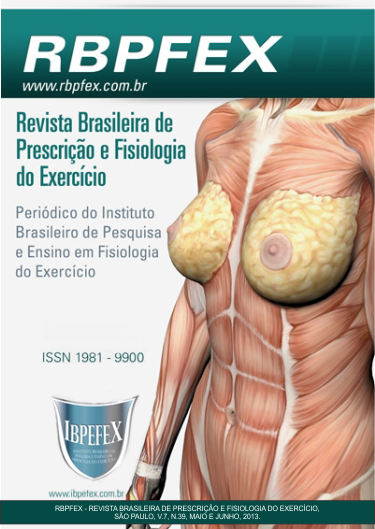Effects of physical activity in psycho-social capacity and functional of elderly
Abstract
Objective: To evaluate the effects of physical activity on psychosocial and functional capacity of the elderly. Materials and methods: Held in health clinics in Recife / PE. Sample of 96 elderly divided between sedentary and exercise practitioners responded to the questionnaire SF-36 quality of life. We evaluated 8 domains divided into physical and mental. It used standard deviation for normally distributed continuous variables and percentages for categorical variables. The normality and homogeneity of values determined by the Kolmogorov-Smirnov and Levene, respectively. We used descriptive statistics and compared the evaluations by the Mann-Whitney test for independent samples. Being the 5% significance level, the comparison by SPSS, Windows 15.0. Results: Mean age was 68.78 (sedentary), 70.23 (ground) and 71.72 (immersion), female majority. The physical and mental components showed better scores in soil and immersion. In areas general state of health, social and mental health practitioners had higher scores on immersion. Discussion: Negreiros (2004) reports the feminization of aging, going according to results. The best quality of life in physically active is consistent with the literature, mainly in immersion for advantages in senile stage. Conclusion: Given the above it is clear the importance of physical activity for the elderly, emphasizing practical benefits of immersion.
References
-Bassett, D. R.; e colaboradores. Validity of for motion sensors in measuring moderate intensity physical activity. Med. Sci. Sports Exerc. Knoxville. Vol. 32. Núm. 9. 2000. p. 471-480.
-Borges, M. R. D.; Moreira, A. K. Influências da prática de atividades físicas na terceira idade: estudo comparativo dos níveis de autonomia para o desempenho nas AVDs e AIVDs entre idosos ativos fisicamente e idosos sedentários. Motriz Rev. Educ. Fís. Vol. 15. Núm. 3. 2009. p. 562-573.
-Ciconelli, R. M.; Ferraz, M.B.; Santos W. Tradução para à Língua Portuguesa e Validação do Questionário Genérico de Avaliação de Qualidade de Vida SF-36 (Brasil SF-36). Revista Brasileira de Reumatologia. Vol. 39. Núm. 1. 1999. p. 143-150.
-Matsudo, S. M.; Matsudo, V. K. R.; Barros Neto, T. L. Impacto do envelhecimento nas variáveis antropométricas, neuromotoras e metabólicas da aptidão física. Revista brasileira de ciência e movimento. Vol. 8. Núm. 4. 2000. p. 21-32.
-Matsudo, S. M.; Matsudo, V. K. R.; Barros Neto, T. L. Atividade física e envelhecimento: aspectos epidemiológicos. Rev. Bras. Med. Esporte. Niterói. Vol. 7. Núm. 1. 2001. p. 2-13.
-Mota, J.; e colaboradores. Atividade física e qualidade de vida associada à saúde em idosos participantes e não participantes em programas regulares de atividade física. Rev. bras. Educ. Fís. Esp. São Paulo. Vol. 20. Núm. 3. 2006. p. 219-225.
-Nakagava, B. K. C.; Rabelo, R. J. Perfil da qualidade de vida de mulheres idosas praticantes de hidroginástica. Rev Dig Educ Fís. Vol. 2. Núm. 1. 2007. p. 1-14.
-Negreiros, T.C.G.M. Sexualidade e gênero no envelhecimento. Revista Alceu. Vol. 5. Núm. 9. 2004. p. 77-86.
-Pacheco, M. D. A.; e colaboradores. Qualidade de vida e performance em Idosos: estudo comparativo. Saúde Rev. Vol. 7. Núm. 17. 2005. p. 47-52.
-Pereira, A.S.; e colaboradores. A percepção da melhora da capacidade funcional em indivíduos da terceira idade praticantes de hidroginástica. Rev. Dig. Saúde. Vol. 2. Núm. 1. 2003. p. 34-38.
-Rezende, N.; e colaboradores. Avaliação da qualidade de vida de aposentados com a utilização do questionário SF36. Revista da Associação Médica Brasileira. Vol. 54. Núm. 1. 2008. p. 55-60.
Authors who publish in this journal agree to the following terms:
- Authors retain the copyright and grant the journal the right of first publication, with work simultaneously licensed under the Creative Commons Attribution License BY-NC which allows the sharing of the work with acknowledgment of the authorship of the work and initial publication in this journal.
- Authors are authorized to enter into additional contracts separately for non-exclusive distribution of the version of the work published in this journal (eg, publishing in institutional repository or book chapter), with acknowledgment of authorship and initial publication in this journal.
- Authors are allowed and encouraged to post and distribute their work online (eg, in institutional repositories or on their personal page) at any point before or during the editorial process, as this can bring about productive change as well as increase impact and impact. citation of published work (See The Effect of Free Access).






